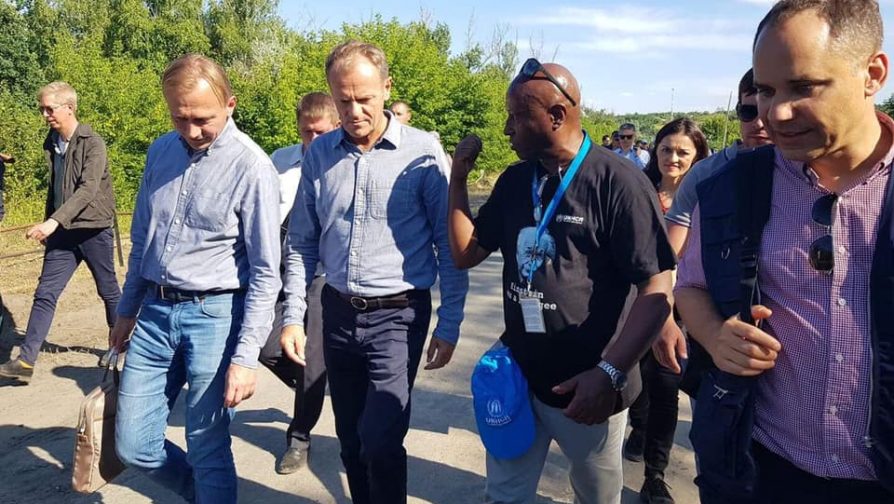UNHCR voices needs for improvements at Stanytsia Luhanska entry-exit crossing point to the President of Ukraine and the President of the EU Council
UNHCR briefed the high-level visitors on the urgency to repair the broken bridge at Stanytsia Luhanska
8 July 2019, Stanytsia Luhanska – On Sunday, 7 July 2019, UNHCR provided a briefing to Ukraine’s President Volodymyr Zelensky and the President of the European Union Council Donald Tusk on conditions and improvements made at Stanytsia Luhanska entry-exit crossing point (EECP) thanks to multi-donor support. The newly appointed Head of Luhansk Civil-Military Administration, Vitaliy Komarnytskyi, was also a part of the visiting delegation.
UNHCR briefed the high-level visitors on the urgency to repair the broken bridge at Stanytsia Luhanska, establish government-run medical points at the EECP and improve the means of transport for the elderly and persons with reduced mobility crossing at the Stanytsia Luhanska check point. Since 2016, UNHCR has been supporting the EECPs on the government-controlled side through office equipment and furniture, air-conditioned tents for those civilians who have to overnight at the check points, and shelters that protect those crossing from harsh climatic conditions.
UNHCR is working on the territories along the 500 km ‘contact line’ which separates Government controlled areas (GCA) and non-Government controlled areas (NGCA) in eastern Ukraine in order to provide humanitarian assistance to civilians and ensure freedom of movement. Along the ‘contact line’, there are five open exit-entry check points (EECP) in Hnutove, Novotroitske, Marinka, Mayorsk and Stanytsia Luhanska, where internally displaced and conflict affected persons cross to visit relatives, buy food and other goods, receive social payments and check on their property.
Since the opening of these EECPs, the number of people crossing the ‘contact line’ continues to grow. In May 2019 alone, there were 1,206,900 recorded crossings through all five of the EECPs. Long queues and correspondingly, long waiting times at checkpoints continue to be reported. During their journey to cross the ‘contact line’, very often people face difficult weather conditions, and slow processing times. These civilians who cross the ‘contact line’ have limited access to basic services such as drinking water, latrines, weather shelters, heating, and medical care.

Information materials for mass media:
UNHCR Ukraine Support at Checkpoints – November 2018
Checkpoints Monthly Crossings – Online Dashboard
UNHCR Ukraine/R2P Eastern Ukraine Checkpoint Monitoring – Online Dashboard – 2019
For more information, please contact Victoria Andrievska, [email protected]
Photo ©UNHCR/O.Lytvynenko
